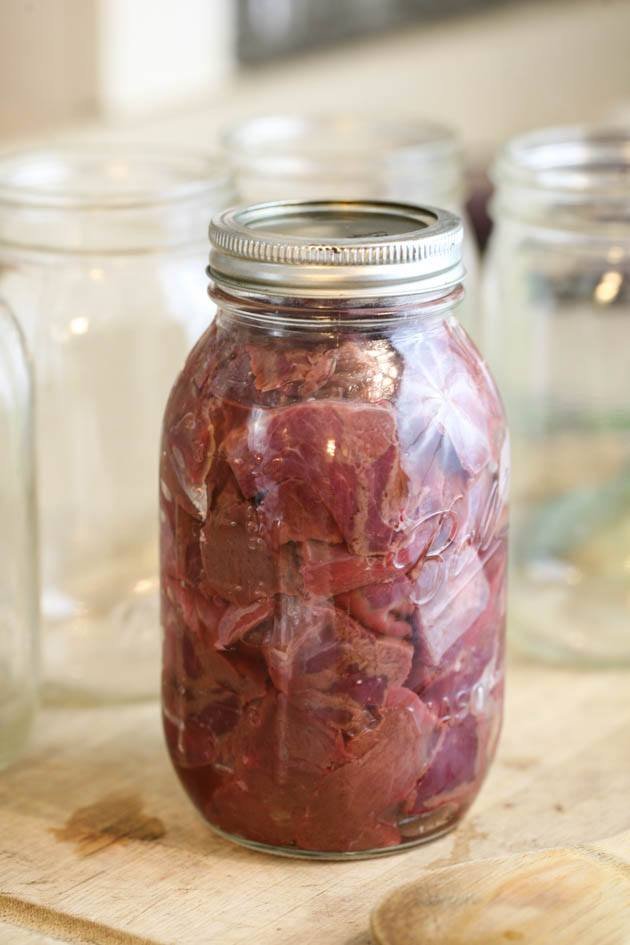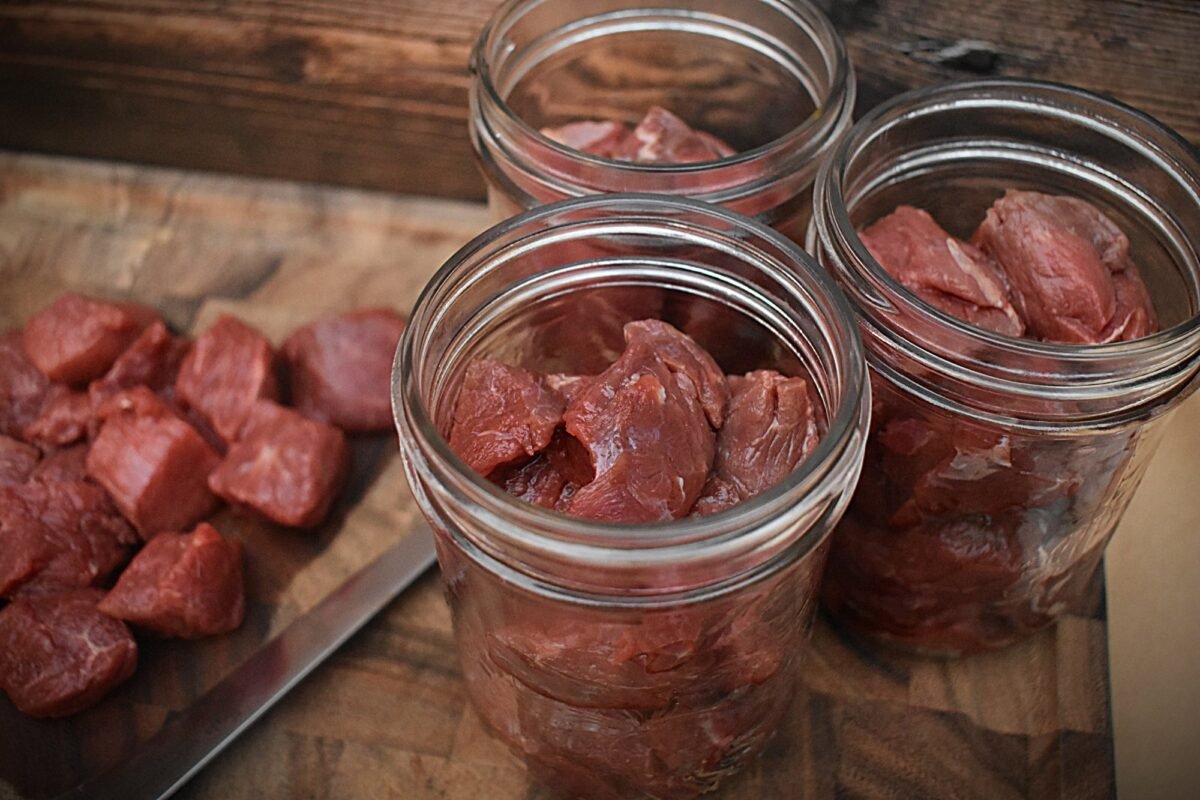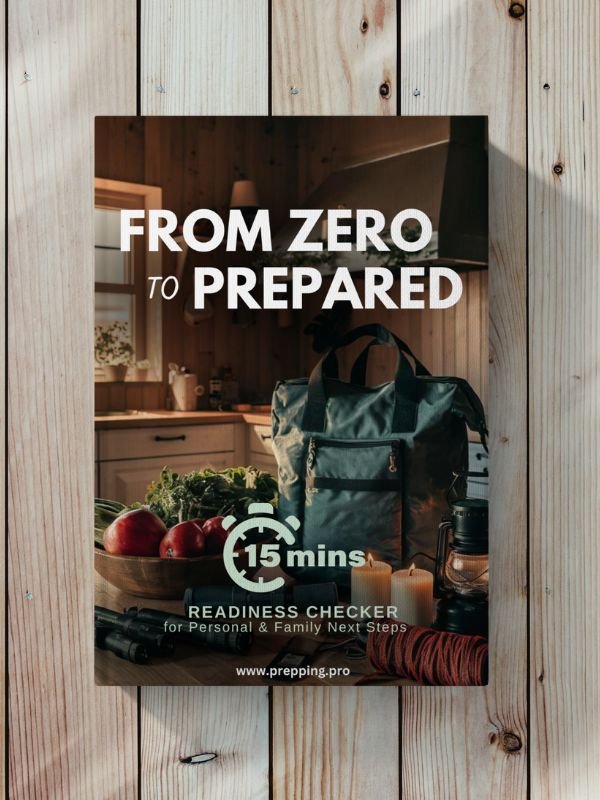Canned meat can stay good way past its “best by” date, especially when stored properly. In a cool, dark place, canned meat can last 2-5 years, and sometimes even longer. But, it’s not just about the date.
You’ve got to keep an eye on storage conditions like temperature and humidity, and always check for signs of spoilage like bulging cans or off smells before you dig in.
However, knowing the canned meat expiration date, proper storage methods, and signs of spoilage can mean the difference between a robust emergency food supply and potential food waste or safety risks.
This comprehensive guide covers everything you need to know about maximizing the shelf life of canned meat, including practical tips, guidelines from experts, and insights into the science behind canned meat preservation.
Key Takeaways:
- Canned meat has an extremely long shelf life when stored properly, making it ideal for emergency food storage
- Printed expiration dates are not definitive – canned meat can remain safe for years longer with proper conditions
- Factors like temperature, moisture, light exposure, and stock rotation impact the shelf stability of canned meats
- Understanding signs of spoilage is critical to avoid consuming contaminated or unsafe canned goods
- Following expert guidelines and best practices maximizes your canned meat investment and preparedness
Table of Contents
Understanding Canned Meat Expiration Dates

What Do Expiration Dates Mean?
- “Best by” dates indicate peak quality, not safety cut-off
- Actual expiration dates relate to risk of spoilage/contamination
- Cans are typically safe past printed dates if properly stored
Factors Affecting Canned Meat Expiration Dates
Several factors influence the longevity of canned meats:
| Factor | Impact |
|---|---|
| Acidity | Low-acid foods like meat have shorter shelf lives |
| Salt/Preservatives | Higher levels extend shelf life |
| Processing Method | Pressure-canning provides longer shelf life |
| Can Material | Cans with enamel liners last longer |
- Canning method and ingredients play a major role in determining shelf life estimates.
- Properly canned meat can remain safe for years past printed dates.
The Shelf Life of Canned Meat

Average Shelf Life Expectations
While there is no definitive single answer, here are some general guidelines:
| Canned Meat Type | Typical Shelf Life |
|---|---|
| Beef/Pork | 2-5 years |
| Chicken/Turkey | 2-3 years |
| Fish/Seafood | 2-5 years |
- Shelf life starts from canning date, not purchase date
- Proper storage can significantly extend usable shelf life
- Check for signs of spoilage before consuming past best-by date
Maximizing Canned Meat Shelf Life
To get the most from your canned meat storage:
- Store in cool, dark area around 50°F-70°F
- Ensure stable temperature – avoid fluctuations
- Rotate stock regularly using oldest first
- Inspect cans before use for signs of spoilage
For long-term canned meat storage, consider using vacuum sealers or mylar bags to extend shelf life even further.
Canned Meat Storage Best Practices
Ideal Storage Locations
- Cool, dry basements or closets make good storage spots
- Avoid attics, garages, or exterior buildings due to temperature variations
- Keep away from furnaces and water heaters
- Choose areas with little light exposure
Organizing and Rotating Stock
- Label all cans clearly with date and contents
- Use open stock rotation – oldest items go in front
- Consider a can rotation system like FIFO lanes
- Do periodic inventory checks and reorganize
Following the FIFO restocking method helps ensure your oldest canned goods get used first.
Canned Meat Safety and Preservation

Signs of Spoilage
If you notice any of these issues, discard the canned meat immediately:
- Leaking or bulging cans
- Dented cans or broken seams
- Any spurting liquid when opening
- Foul odor or mold growth
- Discoloration or product separation
Proper Handling and Preparation
- Thoroughly wash lids before opening
- Discard cans if contents make hissing noise
- Avoid tasting suspect canned goods
- Heat canned meats to proper temperatures
- Refrigerate unused portions promptly
Always follow safe food preparation practices and understand temperature control in food handling.
Following Canned Meat Guidelines
Government and Industry Recommendations
- USDA recommends using low-acid canned goods within 2-5 years
- FSIS guidelines say most shelf-stable canned meats last 2-5 years
- National Center for Home Food Preservation gives timelines by type of meat
- Industry associations like the Can Manufacturers Institute provide guidance
Addressing Common Concerns and Myths
| Myth | Fact |
|---|---|
| You should never eat food from bulging, leaking, or badly dented cans. | ✅ Discard these cans as they are likely contaminated from seal failures or bacterial growth. |
| Canned foods never expire if the can remains intact. | ❌ While intact cans can remain safe for years past printed dates, food quality does degrade over time. Inspect for signs of spoilage before consuming very old canned goods. |
| Freezing canned foods extends their shelf life indefinitely. | ❌ Freezing may help short-term storage but will not prevent spoilage indefinitely. The quality will still decline over years. |
| You can always tell by the appearance if a canned food is spoiled. | ❌ Some types of contamination like botulinum toxin are odorless and cannot be detected visually. Cans showing any signs of spoilage should be discarded without tasting. |
| Acidic foods like tomatoes have longer canned shelf lives than meat. | ✅ Lower acid foods like plain meats and vegetables typically have shorter safe shelf lives than high-acid canned goods like fruits and tomatoes. |
| Cans will begin leaking long before any food inside spoils. | ❌ Can integrity failures can occur without visible leaks. Always inspect canned goods thoroughly before consumption. |
By separating canned meat fiction from fact, you can store your emergency supplies safely and avoid dangerous food safety pitfalls.
Storing Canned Meat for Long-Term Preparedness
Calculating Needed Quantities
- Account for Family Size
- Consider Individual Calorie Needs
- Factor in Timeframe for Emergency Supply
- Incorporate Variety of Proteins
- Allow for Regular Rotation and Replacement
Check out this guide on building an emergency food supply for more tips.
Integrating Canned Meat into Meal Plans
- Build a Stockpile Inventory Spreadsheet
- Meal Plan from What You Have Stored
- Try New Recipes Using Canned Meats
- Practice Cooking from Your Stockpile
- Incorporate into Regular Meal Rotation
Learning how to cook your emergency food supply with techniques like a portable kitchen stove or solar cooking is also important.
Canned Meat Shelf Stability and Quality Over Time
Changes in Texture and Flavor
As canned meats age, some degradation is normal:
- Meat may become more firm or mushy
- Fats can develop an oxidized or rancid flavor
- Curing ingredients like nitrites may become more prominent
However, cans showing signs of spoilage should always be discarded.
Potential Nutrient Degradation
While still safe when properly stored, nutrient levels can diminish over years:
- Vitamins like thiamine, riboflavin, and niacin degrade faster
- Protein quality may decrease due to amino acid breakdown
- Minerals like iron, zinc, and magnesium are fairly stable
Integrating recently purchased canned meats can help maintain nutrition. Consider stocking up on essential survival vitamins to supplement long-term stored foods.
Conclusion
Canned meat is incredibly shelf-stable, but understanding expiration dates, storage guidelines, food safety practices, and reasonable shelf life expectations is key.
With the right storage conditions and regular stock rotation, canned meat can provide a reliable source of shelf-stable protein for years as part of a robust emergency food supply.
By following industry best practices and maximizing shelf stability, you can ensure your stockpile stays safe, nutritious, and ready when you need it most.


